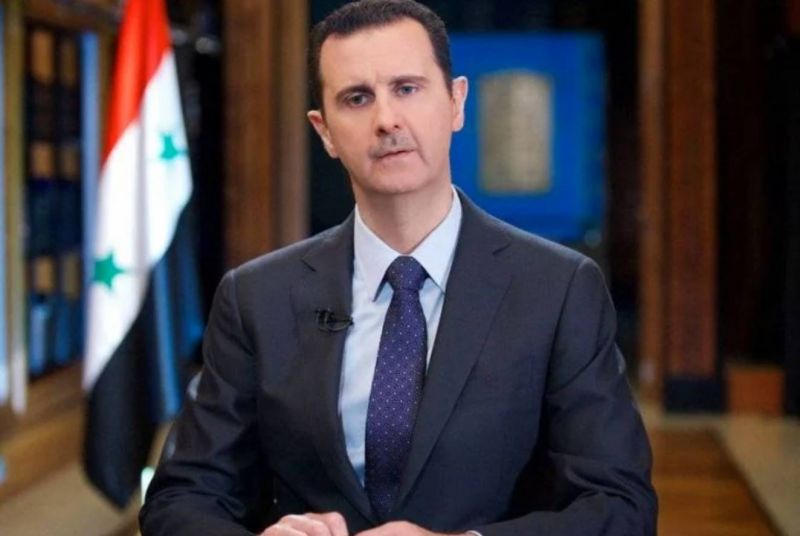
Syrian President Bashar al-Assad. (Credit: AFP archive)
"Participants at COP28: when you talk to Assad, ask him about my brother!"
About 20 people holding signs had gathered a week ago in front of the embassy of the United Arab Emirates (UAE) in London.
Most were family members of detainees and victims of forced disappearance and they came with a clear message: withdraw Bashar al-Assad’s invitation to the 28th United Nations Climate Change Conference (COP28) and end normalization with the regime.
This call was echoed by members of Families for Freedom, an organization representing the relatives of nearly 130,000 Syrians arbitrarily detained in the regime's prisons.
Families for Freedom submitted a petition with over 9,000 signatures to the UAE's embassy in London last week.
While protests like these don’t explain Assad's absence from COP28, where Syrian Prime Minister Hussein Arnous led the Syrian delegation in Dubai on Thursday, international pressure against the regime has far from subsided.
This is despite Syria’s return to the Arab fold, which was formalized by Assad’s presence at the 32nd Arab League summit in Jeddah last May, under the impetus of Saudi Arabia.
An unprecedented arrest warrant issued by France against Assad on November 14, the first issued by a national justice system against a sitting head of state, highlights this continued pressure.
Additionally, Bashar’s brother Maher al-Assad, the head of the Syrian Army’s 4th Division, along with two other senior officials, were accused of complicity in crimes against humanity, and war crimes related to the chemical attacks in August 2013 which killed over 1,000 civilians in Douma and Eastern Ghouta, a suburb of Damascus.
Deterrent Role
The UAE invited Assad to COP28 in May, during his official rehabilitation into the region. Assad has visited the UAE on multiple occasions since 2011 and did not comment on why he chose not to attend the conference. The UAE positioned itself as the initiator of re-establishing diplomatic ties with Syria, and openly expressed its desire to reintegrate the country into the Arab community. It reopened its embassy in Syria in late 2018.
For the victims of the atrocities committed by the Syrian regime, their relatives, and human rights defenders, this invitation had no place.
"Assad should never have been invited to the conference," said Rebecca Falcon, campaign director of The Syria Campaign, a human rights organization supporting Syrians in their struggle for freedom, justice, and democracy. "This [France’s] arrest warrant is an additional reason to abandon any effort at normalization with a regime that gassed its own people with chemical weapons and continues to arbitrarily disappear and kill civilians."
While Bashar al-Assad attended the emergency meetings of the Arab League and the Organization of Islamic Cooperation (OIC) on Gaza, held in Riyadh on Nov. 1, his presence at COP28 would have marked his first appearance at a global conference since the start of the Syrian Civil War 2011. While it's challenging to precisely know the behind-the-scenes of Assad's decision not to personally attend COP28, it seems plausible that the French arrest warrant may have played a role, although no red notice appeared for his name on Interpol's website, since Paris must make a prior request to the international police.
Numerous Interests
Behind the Syrian delegation's participation in COP28, numerous interests are at play. First and foremost, there is a symbolic objective.
"By being present at multilateral meetings, the government demonstrates that Syria is not isolated and cannot be isolated as the United States and other countries wish," said Aron Lund, a researcher at the Century International think tank. "It shows that the country and the Assad regime are still part of Arab and international politics."
However, Syria's presence is also driven by economic considerations, as post-war reconstruction is estimated to require several hundred billion dollars. Quoted by Reuters a few days before COP28, Prime Minister Arnous stated he would strive to obtain funding for climate projects in Syria.
Arnous’ remarks sparked outrage amongst some Syrians, who recalled the destruction and environmental damage inflicted by the Syrian government over the past twelve years throughout the war. "The [Syrian government’s] arsenal, including conventional, chemical, incendiary, fragmentation, and cannon weapons, has had lasting and devastating impacts on the environment, deliberately targeting forests and agricultural lands to burn them as punitive measures," denounced the White Helmets, a rescue group from Syria’s rebel-held areas, on X. "Targeting and destroying the environment destroys the lives and livelihoods of communities, with catastrophic consequences for future generations."
According to a report released in early November by former International Criminal Court judge, Howard Morrison, the Assad regime is responsible for "the devastation and considerable damage caused to the environment" by various bombing campaigns and chemical weapon attacks in recent years. Among the cited damage is significant deforestation in various regions of the country, as a result of the conflict. The governorates of Latakia, Hama, Homs, and Idlib have lost over 36 percent of their forests between 2011 and 2021.
This article was originally published in French in L'Orient-Le Jour.